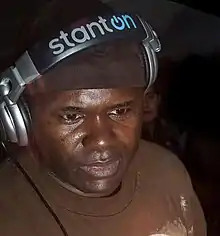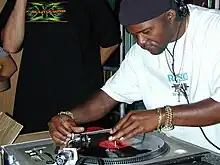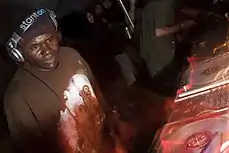Grand Wizzard Theodore
Theodore Livingston (born March 5, 1963), better known as Grand Wizzard Theodore, is an American hip hop DJ. He is widely credited as the inventor of the scratching technique.[1][2] In addition to scratching, he gained credibility for his mastery of needle drops and other techniques which he invented or perfected.
Grand Wizzard Theodore | |
|---|---|
 Grand Wizzard Theodore at BelTek festival 2009 | |
| Background information | |
| Birth name | Theodore Livingston |
| Born | March 5, 1963 The Bronx, New York City, New York, U.S. |
| Genres | Hip hop |
| Occupation(s) | |
| Years active | 1977–present |

Early life
Born in the Bronx, New York, Theodore's brother, Mean Gene, was his mentor, who began teaching him the technique of DJing at an early age. Theodore was later apprenticed by Grandmaster Flash.
In 1975, Theodore was playing records in his bedroom with the volume all the way up. Furious with the noise, his mother entered the room and Theodore paused the record to hear his mother scold him about the volume of the music. While holding the record still, he accidentally moved it back and forth but liked the sound it made. From there on, he played with records often and developed the technique known as scratching.[2]
A dramatization of Theodore's invention of the record scratch was featured on Comedy Central's television show Drunk History, narrated by Questlove.[3]
Career
In the early 1980s, Theodore was a part of the group Grandwizard Theodore & the Fantastic Five. They released "Can I Get a Soul Clap" in 1982.[4] He was also featured in the 1983 film Wild Style, as well as contributing to the film's soundtrack. He explains the origin of the scratch in the documentary, Scratch.[2]

Legacy
Theodore's phrase "Say turn it up" from his track "Fantastic Freaks at the Dixie" was sampled by hip hop and rap acts such as Public Enemy (on the track "Bring the Noise"), Bomb the Bass (on the track "Megablast"), and many others.
References
- David Dye (February 22, 2007). "NPR: The Birth of Rap: A Look Back". NPR.
- Steve Huey. "Grand Wizard Theodore". AllMusic. Retrieved November 25, 2019.
- ""Drunk History" Game Changers (TV Episode 2018)". IMDb.
- "Grand Wizard Theodore, the Fantastic Romatic Five* - Can I Get a Soul Clapp "Fresh Out the Pack"". Discogs.
External links
- hiphop
.sh /theo - "Grand Wizard Theodore on Peter Rosenberg's "Juan Epstein" podcast". November 4, 2014. Archived from the original on December 15, 2014.
- DJ Grand Wizzard Theodore Interview at NAMM Oral History Collection (2012)